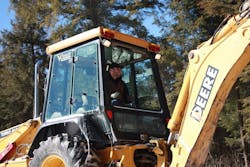Under 40 in Construction Equipment Awards inaugural class member Glenn Vollmer of Vollmer Tar and Chip Asphalt Paving in St. Mary’s, Penn., once faced a dilemma. He loved working on equipment, but he also loved operating equipment.
“When I was a kid, working in my brother’s shop, we did all our own maintenance there,” he says. Vollmer’s brother, Ryan, 14 years his elder, has an established excavating business. “In fact, I almost became a mechanic because I liked doing the maintenance so much, but you don’t get to go out on jobs when you’re the mechanic. If I would have become a mechanic, I would have missed being in the seat.”
This is one of a series of profiles highlighting our Under 40 in Construction Equipment winners. Nominate someone here.
Today, Vollmer, 30, has his own business. He forged out on his own at 23. “With my brother, I was kind of as high up there as I could get. I didn’t want to stop. I wanted to run equipment and work outside.”
Ryan helped him get started with valuable advice that drives how Vollmer manages his own equipment. “I was lucky I could use him as a mentor, to start my own operation,” Vollmer says. “Any advice down the line that I needed, he was able to help me with. Working for him, his advice always was to do your maintenance and keep everything running; the less downtime, the better off you are.
“He also told me to buy new stuff, or almost new stuff, and you’ll get a lot more life out of it. It’s especially important when you’re starting out, because you’re going to work and work and work, and you need good equipment that can keep up with you,” Vollmer says.
Vollmer Tar and Chip Asphalt Paving is religious about maintaining its fleet, doing all its own daily and periodic maintenance (minus equipment on warranty), which is something you might expect from an owner with a passion for working on iron. With a Peterbilt tri-axle, a single-axle dump truck, a single-axle distributor truck, a Mauldin 690G paver, a New Holland L150 skid steer, a Deere 310SE backhoe, and an Ingersoll Rand DD32 roller, the equipment has varied needs.
“Our biggest pain point is dealing with maintenance on the trucks,” Vollmer says. “We are constantly rotating tires, greasing the trucks, and changing the oil. Overall, any time something is broken, we address it immediately, because it will snowball into a huge problem if you don’t. There are all kinds of little things you have to watch for all the time. With tires, as expensive as they are, it’s easier to rotate them and check them periodically to make sure there are no issues.”
Vollmer has his own rule regarding oil changes. “I have a pet peeve—I won’t run anything more than 50 miles past an oil change. That’s a pickup truck, a paver, or anything,” he says. “We change our oils and filters as required, by whatever manufacturer we have, just to prevent any engine failures, rear-ends going out, or hydraulic system failures. The most preventive, easiest maintenance you can do is changing your oil and filters, and greasing.”
He hasn’t had the opportunity to use telematics to help schedule maintenance and gauge machine performance, but he’s keenly interested for the future, even for a fleet with a $275,000 estimated replacement value. He was first exposed to the Komtrax system when his brother’s excavating firm had some Komatsu units.
“I think those types of systems are great,” Vollmer says. “That Komatsu equipment would tell you how long it idled in a day. You get a lot of feedback on how much work your machine’s actually doing in a day’s time.”
One of the possibilities Vollmer sees with telematics is tracking productivity. “You can look at the numbers and say ‘Hey, what’s going on here? You guys worked 10 hours, the machine idled for four, and the other six it was only running at half capacity. Was there something special going on that day, or was it just one of those days where you didn’t want to get much done?’ I think it’s a great way to make sure that everything is working to its full potential—or it doesn’t need to be running.”
Vollmer also foresees telematics affecting his replacement decisions. “I would prefer it, hands down, on every purchase, if I could have that information and feedback,” he says. “Of course, there’s always price. Price is a factor, but if it was down to a machine that had the technology or didn’t have the technology, and the price was fairly close, I would probably go with the machine with the technology.”
Vollmer Tar and Chip will be in the market for some new equipment this summer, and though Vollmer’s game for telematics, he’s far less certain of Tier 4.
“Personally, I’m trying to stay away from it,” he says. “I don’t want to say I’m scared of Tier 4 engines or anything like that, there’s just a whole different aspect of maintaining those machines than I’m used to. I guess I just want it to be out for a little while, to see what the issues might be that arise from it. We’ve gotten used to it with trucks, now it’s going to be another hurdle to get over, getting used to it with machines.”
Vollmer stresses that he hasn’t heard any horror stories about Tier 4 equipment, but he clearly recalls experiences with trucks. “The trucks were so hard to get used to when they had the filters that burned off, and they didn’t seem to get them running right for a couple of years. I guess that’s what I’m waiting for with the machinery: Is it going to take a couple years to get it right, or did they get it right right off the bat?”
A Tier 4 skid steer loader will probably be his first experience. “I’ll be trying Tier 4 and see what all is entailed in maintaining these new machines,” Vollmer says. “I understand the pollution aspect of it, and you always want to try to make the world a better place, and greener. But how much headache is going to be involved with that every day when you’re working?”
Everything in Vollmer’s fleet is “2007 and up,” with the exception of his backhoe. He has but two guidelines in deciding when it’s time to replace a machine.
“If you’re putting a lot of parts in it just to keep it running every day, it’s time to update,” he says. “You can’t have the downtime; you can’t have a machine that you take on a job and have to wonder whether it’s going to run that day or not. I don’t track it on paper, but I keep an eye on it myself because I’m a smaller operation.”
Vollmer also tries to stick to a five-year cycle. “If we’ve owned something and used it every day for 5 years, it may be time to update,” he says. “If we have a machine that we’ve owned from the day it was new, and we’ve maintained ourselves, the hours do matter, but they don’t seem to matter as much as when we’ve bought a used piece that has 1,000 hours on it and wasn’t maintained by us. It seems they have more issues than the pieces we’ve maintained ourselves.”
He does extensive research on equipment, and materials. “What I research more than anything is how to make our jobs more efficient,” Vollmer says. “What equipment features can save time, which in turn saves money? Especially with paving, what can the paver do when you’re paving so there’s less handwork you have to go back and do to take out the imperfections the paver puts in?
“I also do a lot of research on oils, for oil spraying on tar and chip. Which oils are going to get hard the quickest? Which oils are going to last the longest and can take the weather we have in Pennsylvania? In the wintertime, there’s a lot of freezing and thawing, and that’s the No. 1 thing that kills a parking lot or driveway, the cycle of warm-cold, warm-cold. There’s never a time you’re not asking if there’s a way to improve, if there’s a way to make this work better for the customer.”
About the Author
Frank Raczon
Raczon’s writing career spans nearly 25 years, including magazine publishing and public relations work with some of the industry’s major equipment manufacturers. He has won numerous awards in his career, including nods from the Construction Writers Association, the Association of Equipment Manufacturers, and BtoB magazine. He is responsible for the magazine's Buying Files.

